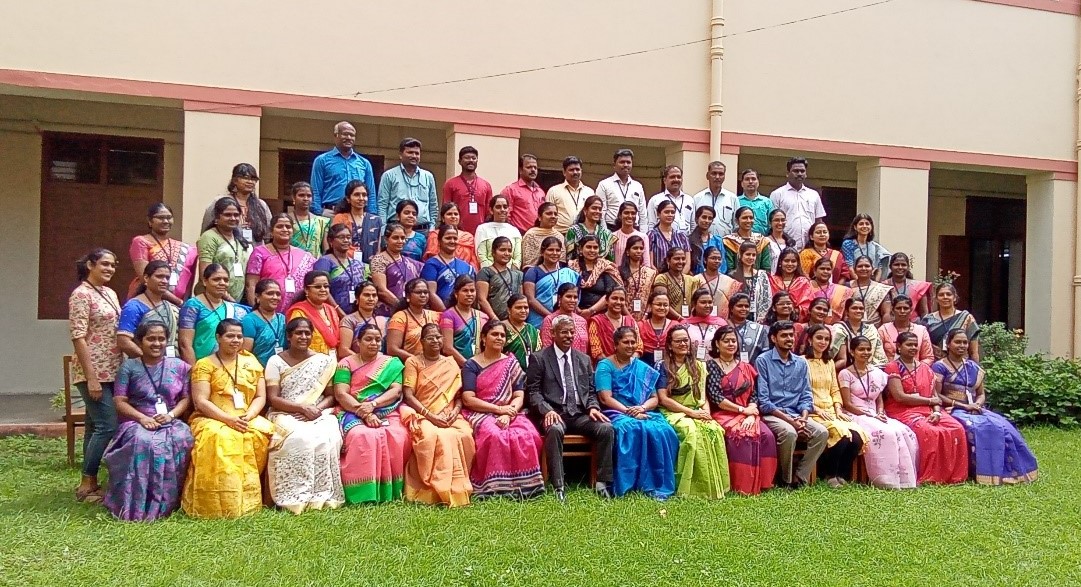
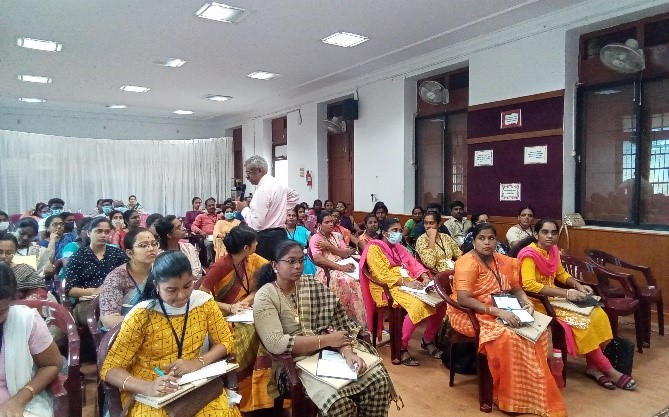
As part of its continuous efforts to develop young faculty in higher education in Asia, the United Board has sponsored the Faculty Development Programme for Young Faculty for Colleges and Universities hosted at St. Christopher’s College of Education in Chennai, India. More than 70 young faculty in various disciplines from different parts of India braved the sweltering weather and attended the program from 12 July to 17 July.
“This program aims at equipping young faculty of different institutions in India to foster whole person education,” said Dr. Maher Spurgeon, Consultant, Director of South Asia Programs of the United Board. “The United Board supported a few faculty from India to undergo an online certificate course at Harvard Bok. A few (who finished the Harvard Bok certificate course) served as resource persons. It has become a kind of echo training. We thank St. Christopher’s College of Education for partnering with us to organize this training program.”
Training the trainers has been one of the strategic goals of the United Board in the past six years. “The Whole Person Education Academy was developed with Ateneo de Manila University in 2017 for faculty training with a specific component of echo training,” said Dr. Angela Wai Ching Wong, Vice President of Programs of the United Board, “This faculty training program held at St. Christopher is one of the best examples of achieving such a goal. It brought together the faculty we sent for the Harvard Bok Certificate program to form a trainers’ team for other Indian faculty.”
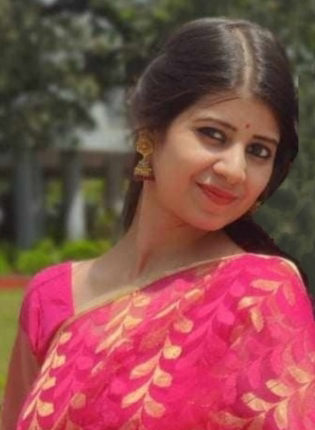
Dr. Shubhra, Assistant Professor of Patna Women’s College
The program offered a comprehensive range of components related to effective teaching and learning. Dr. Shubhra, a participant and assistant professor from Patna Women’s College, Patma, Bihar, recalled: “Sessions on Whole Person Approach, Learning Outcomes, Active Learning Techniques, Construction of Achievement Tests, Teaching Skills, etc., helped the participants become more proficient in the art of effective planning and teaching while other sessions emphasized upon the latest developments in the field of education such as Backward Design Framework, Understanding Gen Z, Universal Design for Learning, Teaching Portfolio, etc.”
Dr. Varbi Roy from the Department of Philosophy at Scottish Church College, Kolkata, was one of the resource persons of the program. She said, “The program was organized to incorporate the learning experiences from the Harvard Bok Higher Education Teaching Certificate Online Short Course. The participants were divided among four mentors, who cleared the doubts at the end of each day on the topics covered. The participants had to conduct micro teaching activities and present their teaching portfolios, which helped them to be more involved.”
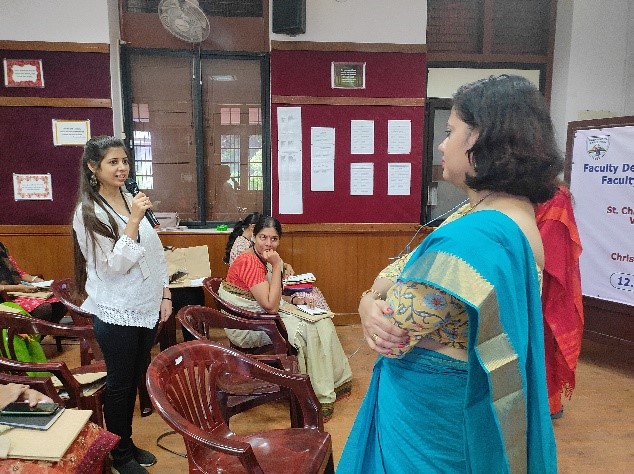
Another resource person Dr. Riddhi Bhattacharya, also from the Department of Philosophy at Scottish Church College, said, “I also mentored some of the participants to help them use some of the teaching tools and active learning methods through micro teaching and finally help them create their teaching portfolios.”
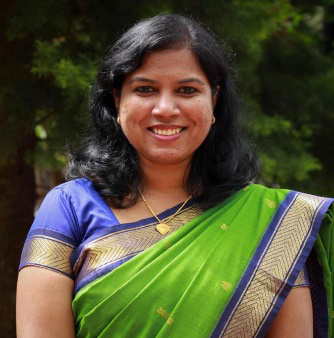
Dr. Usha Priyadarshini S., Assistant Professor of St. Joseph’s University
Dr. Usha Priyadarshini S., Assistant Professor at the Department of Commerce of the School of Business, St. Joseph’s University, Bangalore, rated the program highly: “The objectives or the learning outcomes of the program were well defined in the beginning. The schedule was closely followed by the organizers. The program was structured according to the needs of the participants from different states with varied experiences and knowledge. The facilitators and resource persons were a pool of knowledge and experts in their sessions.”
She added, “The topics and contents were apt to the title and objectives of the program. The activities related to the sessions covered leading to constructive development of the teaching methodology, skills and philosophy. The colleges and universities across the country should undergo this type of program, which is necessary for improving the quality and standard of the education system. Special thanks to Dr. Spurgeon and Dr. Nithila for the opportunity and experience facilitated for us.”
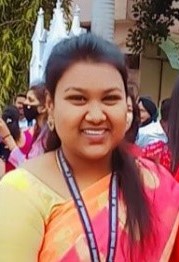
Nidhi Rajak of St. Aloysius Autonomous College
Most of the participants had found the program not only eye-opening but horizon-broadening. Nidhi Rajak of the Department of Commerce at St. Aloysius Autonomous College, Jabalpur, said, “After the program. I’ll be able to engage my students and make them active participants and help them solve problems in the real world. For myself, I’ve developed a deeper understanding of my emotions and personality and about my generation. Most important, I’ve learned to make my teaching portfolios which would better prepare myself for the future. I would like to thank all the faculty members, coordinators and volunteer students for their guidance and hospitality.”

Dr. Valeen Rashmi Pereira of St. Joseph’s University
Dr. Valeen Rashmi Pereira of the Department of Chemistry at St. Joseph’s University, Bangalore, said, “The training has improved my approach and attitude towards teaching, and also guided me regarding how to implement the techniques in real-time classes. The training received will also be shared with the entire faculty of my college. This training also helped me introspect and reflect on my teaching habits. The training has also inculcated a sense of constant learning to equip me with appropriate skills from time to time and I look forward to participating in various programs offered by the United Board. All these impacts are profound and will be an inspiration for lifelong learning.”
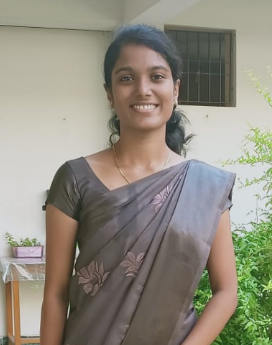
Ms. Asmitha Jenni of CSI Ewart Women’s Christian College
A Gen Z herself, Ms. Asmitha Jenni of the Department of English at CSI Ewart Women’s Christian College, opined, “The next time I get inside the classroom, I would enter with a different perspective that I’m not only a teacher who completes the syllabus but also an influencer. On the whole, this one week has indeed made plenty of changes in me, which I believe would definitely impact my future teaching endeavors.”
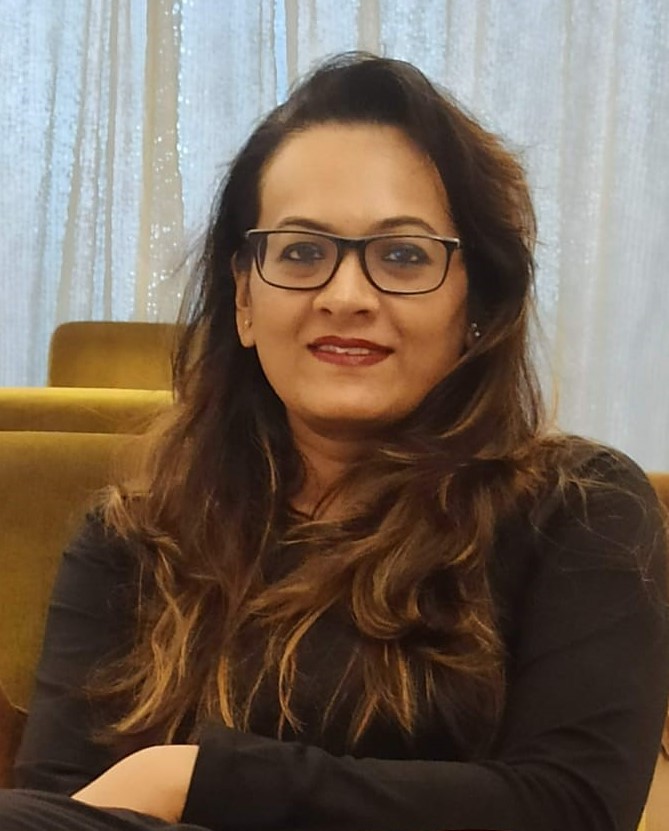
Dr. Varbi Roy of Scottish Church College
Dr. Roy said, “The major takeaway from the Harvard Bok Course is the practice of being reflective. I have tried to percolate this idea to the participants. My motive was to connect OBE (Outcome Based Education) in the Indian context with reference to NAAC (National Assessment and Accreditation Council). I have tried to explain the ways to implement OBE while designing courses, contents and assignments and keeping backward design framework in mind.”
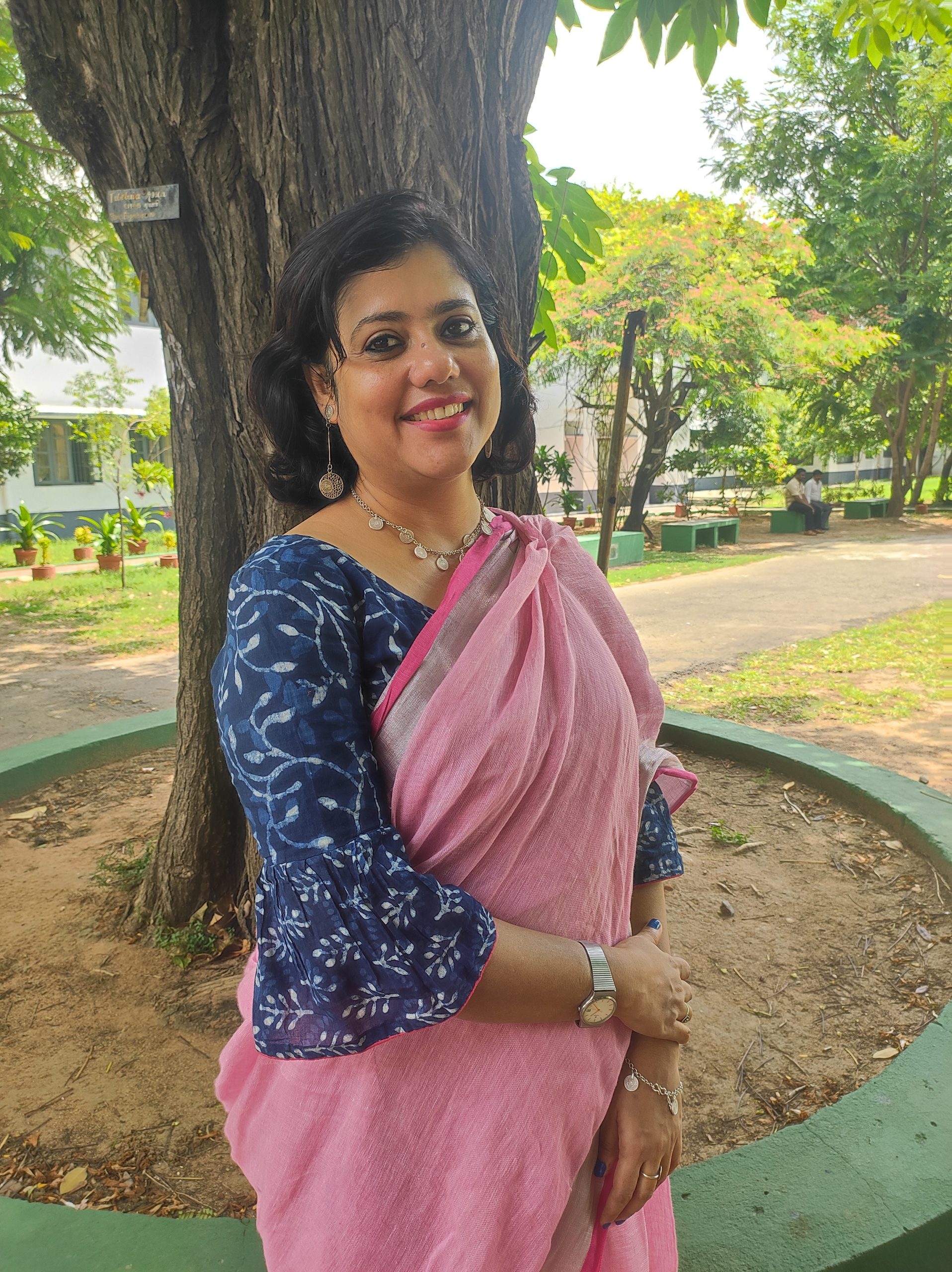
Dr. Riddhi Bhattacharya of Scottish Church College, Kolkatta
Dr. Bhattacharya concluded, “What is most interesting about this program is that after learning about the various teaching skills, active teaching methods, learning outcomes, inclusive education, universal design for learning and backward design, the participants had to apply some of these skills in their microteaching and following the various reading materials and templates prepare their teaching portfolios. I was very impressed by the fact that almost 92% of my mentees followed these. This is what makes the program a success. I sincerely hope that they implement these strategies in their teachings and act as successful facilitators in teaching for Gen Z.”
